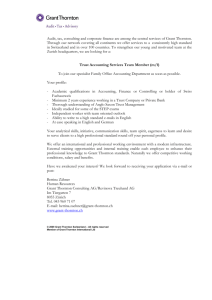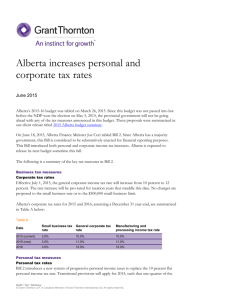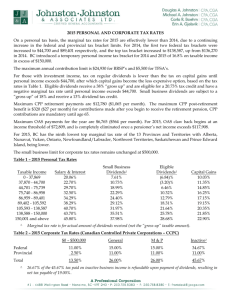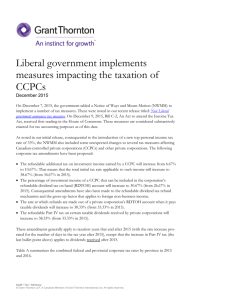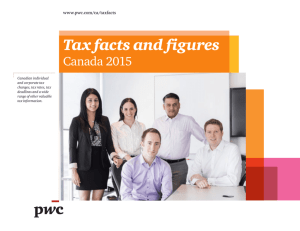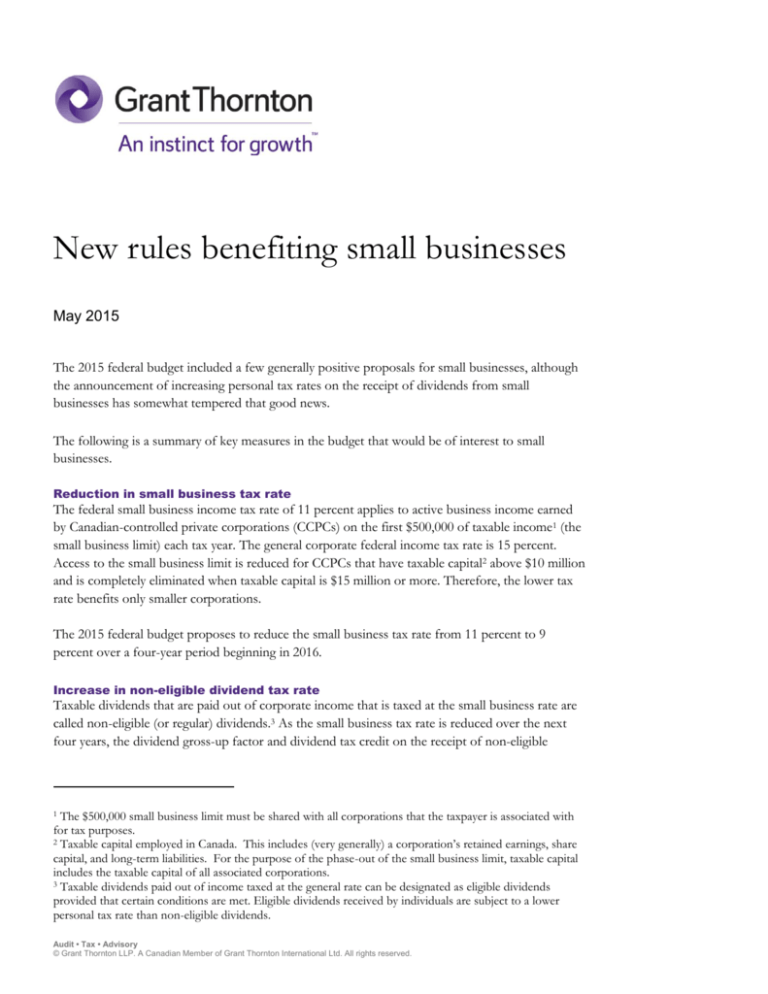
New rules benefiting small businesses
May 2015
The 2015 federal budget included a few generally positive proposals for small businesses, although
the announcement of increasing personal tax rates on the receipt of dividends from small
businesses has somewhat tempered that good news.
The following is a summary of key measures in the budget that would be of interest to small
businesses.
Reduction in small business tax rate
The federal small business income tax rate of 11 percent applies to active business income earned
by Canadian-controlled private corporations (CCPCs) on the first $500,000 of taxable income1 (the
small business limit) each tax year. The general corporate federal income tax rate is 15 percent.
Access to the small business limit is reduced for CCPCs that have taxable capital2 above $10 million
and is completely eliminated when taxable capital is $15 million or more. Therefore, the lower tax
rate benefits only smaller corporations.
The 2015 federal budget proposes to reduce the small business tax rate from 11 percent to 9
percent over a four-year period beginning in 2016.
Increase in non-eligible dividend tax rate
Taxable dividends that are paid out of corporate income that is taxed at the small business rate are
called non-eligible (or regular) dividends.3 As the small business tax rate is reduced over the next
four years, the dividend gross-up factor and dividend tax credit on the receipt of non-eligible
The $500,000 small business limit must be shared with all corporations that the taxpayer is associated with
for tax purposes.
2 Taxable capital employed in Canada. This includes (very generally) a corporation’s retained earnings, share
capital, and long-term liabilities. For the purpose of the phase-out of the small business limit, taxable capital
includes the taxable capital of all associated corporations.
3 Taxable dividends paid out of income taxed at the general rate can be designated as eligible dividends
provided that certain conditions are met. Eligible dividends received by individuals are subject to a lower
personal tax rate than non-eligible dividends.
1
Audit • Tax • Advisory
© Grant Thornton LLP. A Canadian Member of Grant Thornton International Ltd. All rights reserved.
dividends by individuals will be reduced as well. This will result in an increase in the federal
personal tax rate on non-eligible dividends.
The following table illustrates the decline in the federal corporate small business tax rate, and the
increase in the top federal personal tax rate on the receipt of non-eligible dividends over the next
four years:
Table
Tax year
Small business
rate
Dividend
gross-up
Dividend
tax credit
Non-eligible
dividend rate
2015
11.00%
18.00%
11.00%
21.22%
2016
10.50%
17.00%
10.50%
21.62%
2017
10.00%
17.00%
10.00%
22.21%
2018
9.50%
16.00%
9.50%
22.61%
2019 and later
9.00%
15.00%
9.00%
22.97%
The reduction in the small business tax rate will be pro-rated for corporations that do not have a
calendar taxation year-end. For example, the small business tax rate applicable to an eligible
corporation with a June 30, 2016 year-end will be 10.75 percent.
Accelerated tax depreciation for M&P machinery and equipment
The tax depreciation, or capital cost allowance (CCA) rate, for machinery and equipment primarily
used in Canada for the manufacturing or processing of goods for sale or lease (M&P equipment)
was 30 percent each tax year (calculated on a declining balance basis) for many years. Beginning
with purchases of M&P equipment after March 18, 2007, the government introduced a temporary
incentive by allowing for an accelerated CCA rate of 50 percent each tax year, depreciated on a
straight-line basis and applicable to businesses of all sizes. This temporary measure was extended a
few times, so that it now applies for all acquisitions of eligible M&P equipment from March 19,
2007 to December 31, 2015.
The 2015 federal budget announced a 10-year extension of the 50 percent accelerated CCA rate for
M&P equipment acquired from January 1, 2016 to December 31, 2025. The one difference is that
the CCA claim will be calculated on a declining-balance basis and eligible assets will be included in
new Class 53. This measure will apply to businesses of all sizes.
Source deductions for new small business employers
Another measure proposes less frequent required remittances of income tax, employment insurance
and Canada Pension Plan contributions (payroll tax withholdings), by eligible new small business
employers, beginning in 2016.
Current rules
New employers are currently required to remit payroll taxes on a monthly basis for at least one year,
after which they may be eligible to apply for quarterly remittances if they have an average monthly
withholding amount of less than $3,000, and have demonstrated a perfect compliance record over
the preceding 12 months.
Audit • Tax • Advisory
© Grant Thornton LLP. A Canadian Member of Grant Thornton International Ltd. All rights reserved.
Proposed rules
Beginning with 2016 payroll tax remittance obligations, immediate quarterly remittances will be
permitted for new employers with average monthly withholding amounts of less than $1,000.
Quarterly remittances can be maintained as long as the new employer has a perfect compliance
record and its monthly withholding amount remains under $1,000.
Please contact us if you have any questions about any of the proposed measures discussed in this
release or any of the other measures announced in the 2015 federal budget.
About Grant Thornton
in Canada
Grant Thornton LLP
is a leading Canadian
accounting and advisory firm
providing audit, tax and
advisory services
to private and public
organizations. We help
dynamic organizations
unlock their potential for
growth by providing
meaningful, actionable
advice through a broad range
of services. Together with
the Quebec firm Raymond
Chabot Grant Thornton
LLP, Grant Thornton in
Canada has approximately
4,000 people in offices
across Canada. Grant
Thornton LLP is a Canadian
member of Grant Thornton
International Ltd, whose
member and correspondent
firms operate in over 100
countries worldwide.
The information contained
herein is prepared by Grant
Thornton LLP for
information only and is not
intended to be either a
complete description of any
tax issue or the opinion of
our firm. Changes in tax laws
or other factors could affect,
on a prospective or
retroactive basis, the
information contained
herein. You should consult
your Grant Thornton LLP
adviser to obtain additional
details and to discuss
whether the information in
this article applies to your
specific situation.
A listing of Grant Thornton
offices and contact
information can be found on
our Web site at:
www.GrantThornton.ca
Audit • Tax • Advisory
© Grant Thornton LLP. A Canadian Member of Grant Thornton International Ltd. All rights reserved.

